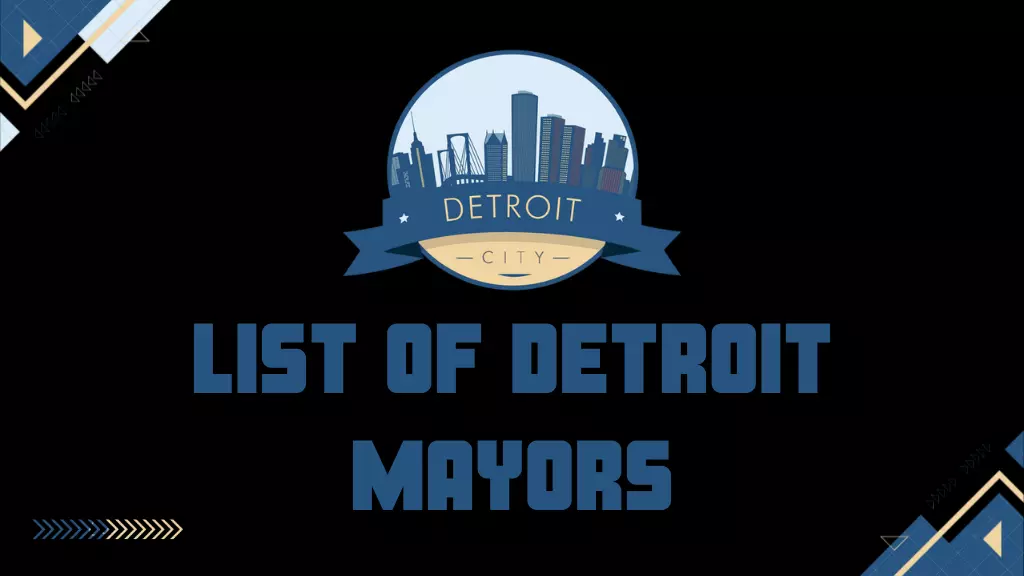Detroit, one of the most iconic cities in the United States, has been shaped by a long line of influential leaders who have served as mayor. The list of Detroit mayors spans from the city’s earliest days in the 19th century to the modern era, reflecting not only changes in local governance but also the broader history of Michigan and America itself. Each mayor contributed to the city’s growth, resilience, and identity, whether by guiding Detroit through industrial booms, facing challenges of economic decline, or leading revitalization efforts in recent decades. Understanding this leadership journey offers an important perspective on how Detroit evolved into the city it is today.
Early Beginnings of Detroit’s Mayoral Office
The office of mayor in Detroit was established in the early 19th century, at a time when the city was still relatively small but strategically important because of its location along the Detroit River. Detroit became a city in 1815, but it wasn’t until 1824 that John R. Williams was elected as the first mayor under a newly adopted city charter. His tenure marked the beginning of a tradition of local governance that continues to this day. These early mayors dealt with foundational issues such as city planning, public safety, and trade regulations, laying the groundwork for Detroit’s transformation into a major American metropolis.
The Industrial Expansion Era
By the mid-19th century, Detroit was growing rapidly thanks to shipping, manufacturing, and later the rise of the automotive industry. Mayors during this period had the task of managing the challenges that came with expansion, population increases, infrastructure development, and public health concerns. Leaders such as Hazen S. Pingree, who served from 1890 to 1897, stood out for progressive reforms. Pingree, often remembered as one of Detroit’s most influential mayors, fought against corporate monopolies and initiated programs to improve living conditions for working-class residents. His leadership style set an example for how local governance could directly impact the lives of ordinary citizens.
Detroit Mayors in the 20th Century
The 20th century marked Detroit’s transformation into the “Motor City,” highlighting leaders who navigated both prosperity and hardship. In the early decades, the booming automotive industry attracted workers from across the nation and the world, swelling the city’s population. Mayors had to address issues of housing, transportation, and labor relations, often balancing the interests of powerful corporations with the needs of the working class.
Leadership Through the Great Depression
The Great Depression of the 1930s placed enormous strain on Detroit’s economy, and its mayors were forced to adopt emergency measures to keep the city afloat. Frank Murphy, who served from 1930 to 1933, became a pivotal figure during this time. He implemented relief programs, worked to maintain social services, and later went on to hold national offices, including serving as a U.S. Supreme Court Justice. His tenure illustrated how local leadership could have a lasting influence on both the city and the nation.
Mayors During Detroit’s Golden Age
In the mid-20th century, Detroit experienced its golden age as the heart of American industry and culture. Leaders like Albert Cobo, who served in the 1950s, focused on urban development and modernization. However, this period also saw growing racial tensions and economic disparities that would later erupt into challenges for the city. Detroit’s mayors in this era had the dual responsibility of promoting economic growth while addressing social inequalities, a balance that proved increasingly difficult to achieve.
The Civil Rights Movement and Social Change
The 1960s and 1970s were transformative decades for Detroit, and the city’s leadership reflected the urgency of the times. Jerome Cavanagh, who served during the 1960s, is remembered for his role during the civil rights era and the tumultuous 1967 Detroit riots. His administration faced enormous pressure to address racial tensions, housing shortages, and the demand for equal opportunities. The challenges he faced highlight how the mayor’s office became a focal point for broader social struggles in America.
The Coleman Young Era
Perhaps no single figure in Detroit’s political history is as prominent as Coleman A. Young, who served from 1974 to 1994. As the city’s first African American mayor, Young’s two-decade tenure symbolized both progress and controversy. He worked to empower Black communities, diversify city employment, and push back against systemic discrimination. At the same time, his administration faced criticism for issues such as rising crime rates, shrinking tax bases, and strained relations with suburban communities. Despite the controversies, Young’s impact on Detroit’s identity and politics remains undeniable, and his name is inseparable from the city’s late 20th-century history.
Leadership After Coleman Young
Following Young’s lengthy term, Detroit entered a period of political transition. Leaders such as Dennis Archer (1994–2001) sought to rebuild trust and attract investment back to the city. Archer worked to stabilize finances and foster partnerships with businesses, emphasizing a vision of renewal. His tenure marked an attempt to pivot from decades of decline toward revitalization, a theme that would dominate Detroit’s political discourse for years to come.
Detroit’s Mayors in the 21st Century
The 21st century has been a time of both hardship and hope for Detroit, and its mayors have played central roles in navigating these changes. The early 2000s saw economic struggles, population decline, and political scandals, most notably the corruption case involving Mayor Kwame Kilpatrick, which damaged public trust. Yet, these challenges set the stage for a new era of reform and recovery.
The Road to Recovery
Dave Bing, who served from 2009 to 2013, stepped into office during one of Detroit’s most difficult times, as the city was approaching bankruptcy. A former NBA player and businessman, Bing emphasized fiscal responsibility and restoring confidence in city leadership. His pragmatic approach paved the way for the difficult but necessary steps that followed.
Bankruptcy and Rebuilding
In 2013, Detroit became the largest U.S. city to file for bankruptcy, a historic moment that underscored decades of financial decline. Mayor Mike Duggan, who took office in 2014, has been central to Detroit’s post-bankruptcy recovery. Under his leadership, the city has focused on improving public services, attracting new businesses, revitalizing neighborhoods, and restoring pride in Detroit’s identity. Duggan’s tenure represents a new chapter in the city’s history, one defined by resilience and a determination to reinvent itself.
Why the List of Detroit Mayors Matters
Studying the history of Detroit’s mayors is more than an exercise in record-keeping. It is a way of understanding how leadership shapes a city’s destiny. Each mayor faced unique challenges, whether managing industrial growth, confronting social unrest, or leading recovery after financial collapse. Together, their stories form a narrative of resilience, innovation, and transformation. The city’s leaders embody the struggles and triumphs of the community they served, making their history deeply relevant to both residents and those interested in urban development.
Conclusion
The long and diverse list of Detroit mayors provides a powerful lens through which to view the city’s evolution from a small frontier town to a global industrial hub, and finally into a city redefining itself in the 21st century. From early leaders like John R. Williams to modern figures like Mike Duggan, the mayors of Detroit have guided the city through eras of prosperity, crisis, and rebirth. Their legacy illustrates not only the challenges of urban leadership but also the enduring spirit of Detroit itself. By reflecting on this lineage, one gains a deeper appreciation for how leadership continues to shape the future of this historic American city.
FAQs
Who was the first mayor of Detroit?
The first mayor of Detroit was John R. Williams, elected in 1824 after the adoption of the city’s first charter. He played a foundational role in establishing the structure of local governance and helped set the tone for future leadership.
Who was the longest-serving mayor of Detroit?
Coleman A. Young holds the record as Detroit’s longest-serving mayor, with five consecutive terms from 1974 to 1994. His two decades in office left a lasting mark on the city’s politics, culture, and identity.
How many mayors has Detroit had in total?
Since the position was created in 1824, Detroit has had more than 70 different mayors, each serving during unique and challenging periods in the city’s history. This long succession of leaders reflects the city’s resilience and adaptability over time.
Who is the current mayor of Detroit?
The current mayor of Detroit is Mike Duggan, who first took office in 2014. His leadership has focused on revitalization after the city’s bankruptcy, improving services, attracting investment, and fostering neighborhood renewal.
Why is the history of Detroit’s mayors important?
The history of Detroit’s mayors matters because it provides insight into how leadership decisions shaped the city’s growth, economic development, and response to challenges. Understanding this history helps explain both Detroit’s struggles and its ongoing revival.





